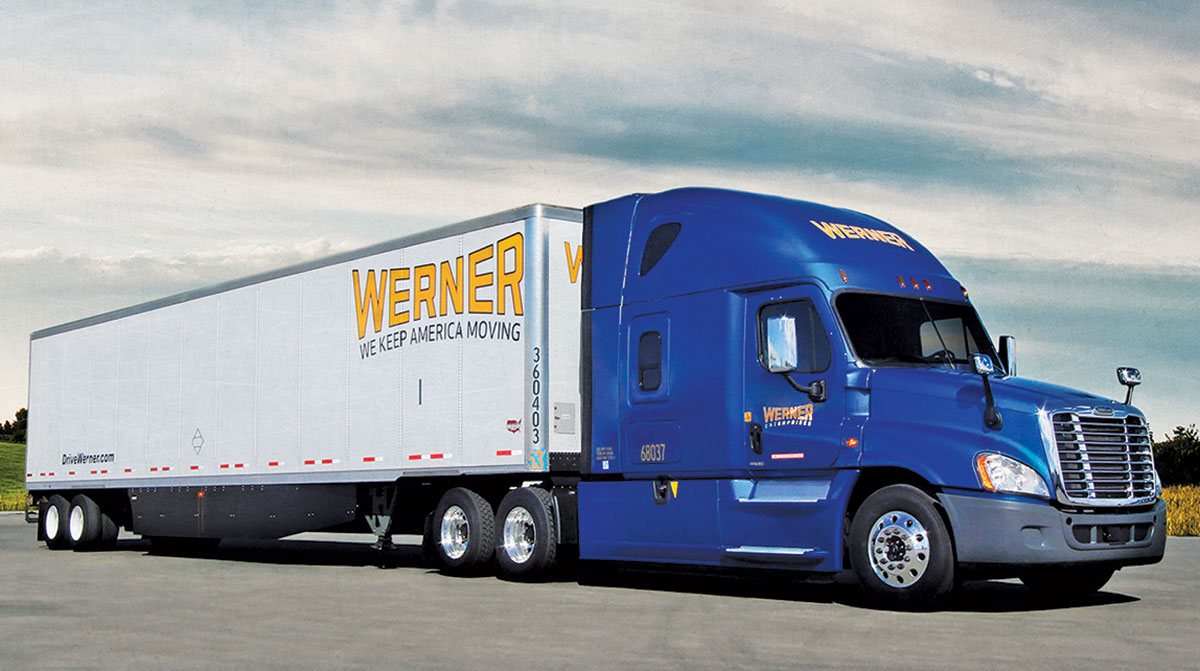Staff Reporter
Werner Eyes Better Back Half of 2023 as Q2 Profit Falls 59%

[Stay on top of transportation news: Get TTNews in your inbox.]
Profits at Werner Enterprises Inc. more than halved in the second quarter of 2023, but executives at the carrier see brighter prospects for the second half of the year, particularly the final three months.
Werner’s net income in the second quarter of 2023 decreased 59% to $29.9 million from $72.29 million a year earlier, the company said Aug. 3, which analysts said was no surprise.
Omaha, Neb.-based Werner reported diluted earnings per share of 47 cents, compared with EPS of $1.12 a year earlier.
Werner Enterprises ranks No. 17 on the Transport Topics Top 100 list of the largest for-hire carriers in North America and No. 4 on TT’s truckload/dedicated carriers list.
Total revenue in the most recent quarter was $811.1 million, a decrease of $25.2 million compared with the prior-year period’s $836.3 million, due to a $43.4 million decrease or 7% in Truckload Transportation Services revenue to $570.2 million, although this was partially offset by Logistics revenue growth of $20.7 million or 10% to $224.5 million.
The company beat consensus revenue expectations of $807.91 million, according to Zacks Equity Research.
Werner also beat at least one analyst’s expectations on its operating ratio, which provides insight on how a company is doing in balancing its costs and revenue generation. The lower the ratio, the better a company’s performance.
Deutsche Bank research analyst Amit Mehrotra said the company’s operating ratio of 90.2 topped an expected 91. However, said Mehrotra, it will be tough for Werner to improve its margins in the second half without a meaningful improvement in volumes or pricing.
Werner said the TTS segment’s second-quarter revenue decline was largely due to a $42 million year-over-year decrease in fuel surcharge revenues to $76.7 million.

Host Michael Freeze clarifies the differences between predictive and preventive maintenance. He gives fresh commentary on everything from how enhanced connectivity boosts your preventive maintenance plans to what predictive possibilities AI can offer your shop. Tune in above or by going to RoadSigns.ttnews.com.
Average revenue per truck per week decreased 1.1% year-over-year in the three months that ended June 30 at its TTS operations to $4,483 and increased 1.5% over the same period for its dedicated operations to $4,517.
Werner’s top executives expect business conditions to improve in the second half, a process they say has already begun.
“Following a moderating freight environment in February and March, freight was progressively weaker in April and May. However, there was slight improvement in mid-June, which we’ve seen continue throughout July,” CEO Derek Leathers said during the quarterly earnings call.
“The majority of our customers, that we’ve recently had significant dialogue with on the subject, have indicated destocking is largely behind them. So, that’s encouraging,” Leathers said. “They’re also encouraged by some of the macro backdrop data that we all see. Labor is holding up well. Jobs reports are arguably better than what was originally expected. Inflation seems to be waning a little.
“We work a lot with winning customers in the discount retail space, and those folks seem to be faring better than most.”
Want more news? Listen to today's daily briefing above or go here for more info
He added, “So, as we put all that together, and think about the back half, I’d say we’re cautiously optimistic, as are they, But clearly, you’ve still got that tightening ahead of us, you’ve got some pretty stringent lending backdrop, so it’s difficult to say. But it appears to me that we’re seeing the early innings of what could set up more like a normalized [fourth quarter], with some difficult headwinds still ahead of us in [the third quarter].”
Consumers are moderating their discretionary spending and continue to be more value-conscious when it comes to household spending, the company warned in a presentation accompanying the earnings.




